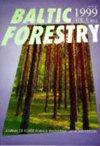Female forest owners as a market segment? Results from a marketing experiment in the context of a small forest service enterprise
IF 0.6
4区 农林科学
Q3 FORESTRY
引用次数: 0
Abstract
Broad social changes are reflected in the forest owner structure, which has become increasingly diverse both demographically and in terms of objectives and values. This naturally also impacts forest owners’ interest towards using their forests as well as to their interest in purchasing various forest management services. This development highlights the need for service providers to better segment their clientele and plan their market communication accordingly. However, a surprisingly small amount of research has focused on the impact of marketing arguments for various forest owner segments. This study provides a first attempt to analyse, through a real-life marketing intervention, how effective marketing arguments are at promoting first thinning to female forest owners. For this, three marketing messages were created and sent out to 300 forest owners in Finland. One message explained the importance of first thinning to provide maximal economic income from forests, one explained the importance of first thinning in relation to biodiversity protection and climate change mitigation, and a control message included no value arguments. The results indicate that contrary to our hypothesis, the marketing message with the economic arguments raised more interest towards the first thinning service among female forest owners than the one with biodiversity protection and climate change mitigation values. The results further show that the control message was found to generate the least interest towards first thinning. This indicates that incorporating value arguments do improve the impact of a marketing message. Key words Market segmentation, female forest owner, marketing argument, economic values, biodiversity values女性森林所有者作为一个细分市场?以某小型森林服务企业为研究对象的营销实验结果
广泛的社会变化反映在森林所有者的结构上,它在人口和目标和价值方面都日益多样化。这自然也影响到森林所有者使用其森林的兴趣,以及他们购买各种森林管理服务的兴趣。这一发展突出表明,服务提供商需要更好地细分其客户,并相应地规划其市场沟通。然而,令人惊讶的是,很少有研究关注营销论点对不同森林所有者群体的影响。这项研究首次尝试通过现实生活中的营销干预来分析营销论点在促进女性森林所有者进行首次间伐方面的有效性。为此,他们创建了三条营销信息,并将其发送给芬兰的300名森林所有者。一份信息解释了首次间伐对于从森林中获得最大经济收入的重要性,一份信息解释了首次间伐对于保护生物多样性和减缓气候变化的重要性,一份控制信息没有提出任何价值论点。结果表明,与我们的假设相反,带有经济论据的营销信息比具有生物多样性保护和减缓气候变化价值的营销信息更能引起女性森林所有者对第一次间伐服务的兴趣。结果进一步表明,发现控制消息对第一次减薄产生的兴趣最小。这表明,结合价值论点确实提高了营销信息的影响。关键词市场细分,女林主,营销论证,经济价值,生物多样性价值
本文章由计算机程序翻译,如有差异,请以英文原文为准。
求助全文
约1分钟内获得全文
求助全文
来源期刊

Baltic Forestry
农林科学-林学
CiteScore
1.60
自引率
0.00%
发文量
23
审稿时长
>12 weeks
期刊介绍:
The journal welcomes the original articles as well as short reports, review papers on forestry and forest science throughout the Baltic Sea region and elsewhere in the area of boreal and temperate forests. The Baltic Sea region is rather unique through its intrinsic environment and distinguished geographical and social conditions. A temperate climate, transitional and continental, has influenced formation of the mixed coniferous and deciduous stands of high productivity and biological diversity. The forest science has been affected by the ideas from both the East and West.
In 1995, Forest Research Institutes and Universities from Estonia, Latvia and Lithuania
joined their efforts to publish BALTIC FORESTRY.
 求助内容:
求助内容: 应助结果提醒方式:
应助结果提醒方式:


